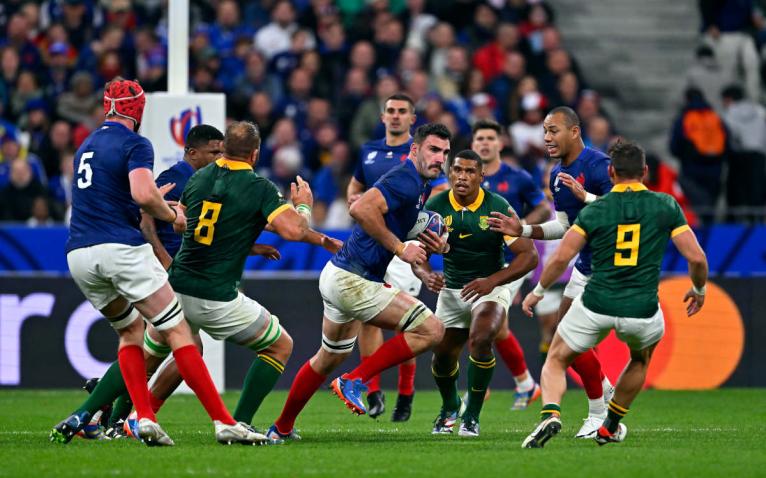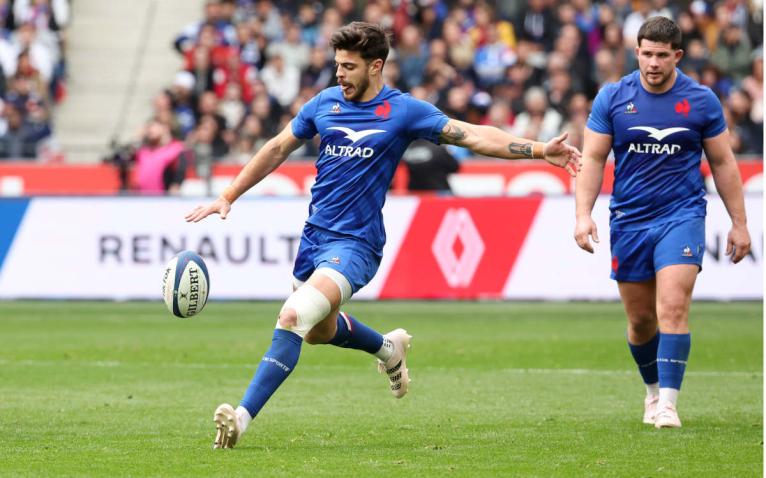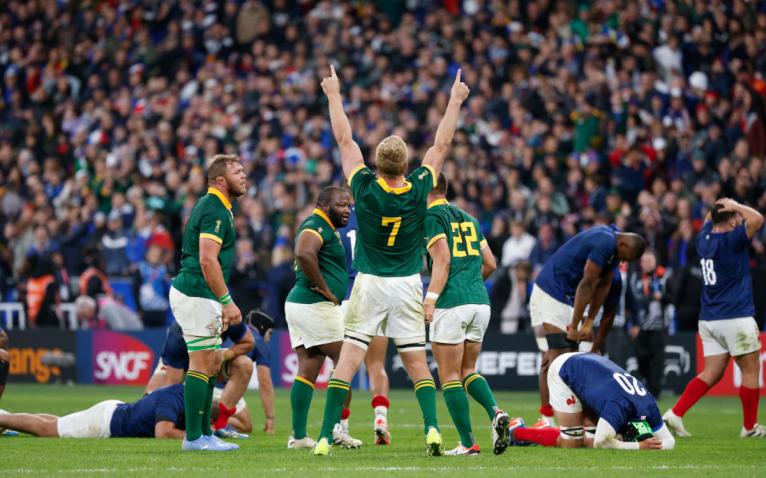Antoine Dupont and Jonathan Danty regretted that in their view the rub of the referring green went the way of South Africa on Sunday. Perhaps it did or maybe the pair were hurting so deeply that they lashed out at an easy target.
France’s World Cup dream died in Paris not because of a referee but because they were overpowered by the reigning world champions. There is no disgrace in that defeat. Maybe France did pay for the fact they had glided through their pool group without ever being seriously tested for 80 minutes, save for their opening match against the All Blacks. The Boks, on the other hand, were primed for battle after their rigorous workouts against Scotland, Tonga and Ireland.
Ultimately, it came down to experience. Twelve of South Africa’s matchday squad in Sunday’s quarter-final were World Cup winners in Japan four years ago; six of the French squad had featured in their quarter-final defeat to Wales in the same tournament.
This is a Springbok generation coming to the end of its cycle; nineteen of their World Cup squad are thirty plus, and only four are under 26; France, on the other hand, selected only eight players on the wrong side of 30 while 17 are 26 or under. Two of those eight, prop Uini Atonio and lock Romain Taofifenua announced their retirement from international rugby after Sunday’s defeat.
For most of the rest there will be another World Cup; Dupont, Peato Mauvaka, Thibaud Flament, Gregory Alldritt and Damian Penaud will be 30 in 2027, Matthieu Jalibert and Romain Ntamack, the two fly-halves, will be 28 and wing Louis Bielle-Biarrey will be only 24. Flanker Charles Ollivon, probably France’s player of the tournament, will be 34, the same age as Neil Back when he won the World Cup with England in 2003.

Then there is the France U20 squad, which won this year’s World Championship, thrashing Ireland 50-14 in the final for their third consecutive title. Four of the squad from the victorious 2018 U20 side featured in this World Cup and one imagines that a similar number will be in Australia for the 2027 World Cup, adding youth to experience.
None of these facts will ease the pain that France is feeling right now. A dejected Dupont made the front pages of Monday’s L’Equipe and Midi Olympique, the latter headlining its image with ‘Aux Larmes’ [‘To Tears’], a play on ‘Aux Armes’, the battle cry of the Revolution].
Inside Midi Olympique disillusionment seeped through the pages, occasionally tinged with bitterness, emotions that are being shared on radio phone-ins and on social media. There is almost a sense that the fans feel betrayed; they had been led to believe that this was their year, that the millions that have been invested by the FFR in recent years would bear fruit.
Never has there been such a large back-room staff for a French national squad, nearly 30 in total, all specialists in their various fields, hired by Galthie in his quest for rugby’s Holy Grail.
France were dumped out of World Cup eight years ago by New Zealand, humiliated 62-13, and in 2019 they went out with a whimper to Wales. This time it was totally different.
Hadn’t deals also been struck between the FFR and the LNR, the body in charge of the Top 14 to give Galthie maximum access to his squad of players? Will the clubs, wondered Midi Olympique, continue to co-operate after this failure or might they say ‘what’s the point of losing our stars for so many weeks when the outcome is as it was in 2015 and 2019: a last-eight exit’.
That would be a disingenuous attitude. France were dumped out of World Cup eight years ago by New Zealand, humiliated 62-13, and in 2019 they went out with a whimper to Wales. This time it was totally different. It was a titanic Test match, a World Cup ‘classic’, according to some. “Fine margins and all that,” as Andy Farrell lamented after Ireland’s defeat to New Zealand in another quarter-final epic. “Sport can be cruel.”

The French fans bemoaning Sunday’s defeat need a reality check. They could start by reading the excellent ‘The Boys of Winter’, Lawrence Dallaglio’s account of how England won the World Cup in 2003. It wasn’t achieved overnight. There were years of pain and setbacks as Clive Woodward’s masterplan began to take shape. Dallaglio recalls one of Woodward’s earliest address to the players, not long after he replaced Jack Rowell as coach in 1997. “What do you want to achieve in your England careers?” he asked them. “I need to hear it from you. Do you want to be the best team in the world?”
It took Woodward and his players six years to achieve that goal; Galthie has been in charge for four, and two of those were severely disrupted by the Covid pandemic. Between 2018 and 2021 France didn’t play a Test against South Africa or New Zealand, depriving them of the chance of gaining crucial experience. England played the Boks five times between 2000 and 2003 and they faced the Wallabies in four matches in the same period. They developed muscle memory about how to play and beat these great rugby nations.
President Emmanuel Macron attended most matches and he also dropped by to press the flesh on the training ground. Always in the background for France has been the constant drip of expectation
What really hurts France is that this World Cup was in their own backyard and millions dreamed of a repetition of 1998, when the footballers lifted the trophy in the Stade de France. Was that though a factor in their defeat? The pressure had been building for months and in recent weeks the media coverage was overwhelming, particularly after Dupont’s injury when the scrum-half became a subject of national debate.
President Emmanuel Macron attended most matches and he also dropped by to press the flesh on the training ground. Always in the background for France has been the constant drip of expectation; perhaps Ireland suffered from something similar. More than one pundit last week – among them Clive Woodward – predicted a Six Nations clean sweep in the quarter-finals. ‘Here comes the Northern Powerhouse,’ boomed Sir Clive.

Who ran out in Paris with less weight on their shoulders last weekend? South Africa and the All Blacks, both of whom had lost pool matches and were most people’s underdogs. Long suffering England supporters surely woke up on Monday morning with a hangover and a wry smile: somehow their boys, the shambles who finished fourth in this year’s Six Nations, are the only European team still standing.
France will have to learn from Sunday’s defeat to the Springboks. It will hurt like hell for weeks, possibly months, but if they harness that pain, use it as a motivator as England did, then the pleasure may come in Australia in 2027
Lawrence Dallaglio believes every great rugby team must endure pain before they feel pleasure. Of the 2003 World Cup-winning squad, the former England No8 reflected: “We were very experienced then but that experience had involved a lot of painful defeats along the way; crucially, however, we learned from every defeat.”
France will have to learn from Sunday’s defeat to the Springboks. It will hurt like hell for weeks, possibly months, but if they harness that pain, use it as a motivator as England did, then the pleasure may come in Australia in 2027



Comments
Join free and tell us what you really think!
Sign up for free